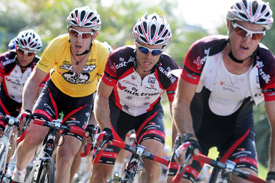Domestic Elite Team status will be required for any non-pro team hoping to take part in NRC’s team standings
 USA Cycling announced a new category of team for 2011 with the intention of bridging the gap between club teams and Continental squads. USA Cycling will call this new breed of outfit, Domestic Elite Teams.
USA Cycling announced a new category of team for 2011 with the intention of bridging the gap between club teams and Continental squads. USA Cycling will call this new breed of outfit, Domestic Elite Teams.
In a press release on USA Cycling, the organization’s director of national events, Micah Rice, spoke about the new concept.
“Following discussion at the NRC event organizers summit in November, the need to organize the top tier of domestic road teams more effectively was clear and the incorporation of these Domestic Elite Teams is one way to help us get there. We also needed a way to raise the degree of consistency and fairness in the NRC Team points calculation and this will allow us to do that while bringing more value to these top tier teams and events around the US.”
The new teams must be all Category 1 riders for men and Categories 1 and 2 for women. The registration deadline to register for domestic elite status is March 15th and will cost 250 dollars.
VeloNation contacted Rice on Tuesday to talk a little bit more about the intriguing new idea.
“The idea is to create that stepping stone to UCI Continental. There are a lot of teams out there Hagens Berman, CalGiant, AeroCat, a number of teams that basically run as small professional teams.”
On a more practical level, necessitating that a team be either Continental or Domestic Elite will create order in the typically unwieldy NRC teams standings once you get out of the top fifteen or so.
“Domestic Elite and Continental teams are the only teams that will get NRC team points, which will completely clean up the NRC team standings.”
Not only that though, the new classification was also created in hopes of giving upward seeking amateur teams a way to separate themselves in terms of showing prospective sponsors that they have a little something to offer, as well as demonstrating a more professional level of operation.
“A lot of amateur teams are out there trying to sell sponsorship, but they can’t call themselves pros, but now, they can say they’re a Domestic Elite team, ranked 19th in the NRC standings, and trying to get to national races. It’s one more level of organization. We’re trying to separate them from just your typical club team and make a new spot between club teams and professional teams.”
For a lot of teams, this won’t make a very big difference, save for an extra 250 dollars in expenses, that some will say, depending on their opinion of the new move, will support their endeavors or needlessly tax them.
Looking to the future, there is certainly a place in American cycling for the Domestic Elite squad. Amateur teams have tried to separate themselves from others in the past by calling themselves Professional, when they did not have a Continental license. It’s an important moniker, and if developed correctly, could create more value for both amateur teams as well as the Continental teams just above them.
Beyond that though, I wondered if it might be possible to create a real stepping stone to the UCI ranks through this new season. Perhaps something akin to the World Tour – the top eighteen teams get ProTeam status, the rest…don’t. Could a Domestic Elite team race at a high enough level to get Continental status?
Of course, the answer is no, as Continental status is based almost entirely on money, which Rice notes.
“This is really just a USA Cycling team, when it’s Continental, then it’s UCI. If we link to the UCI, then it’s all based on money: there’s a bank guarantee and a UCI fee, which means a minimum of fifteen grand. We don’t want to create a financial barrier, 250 bucks a year isn’t much. We’re setting that bar low.”
Still the possibility to reward Domestic Elite teams looks real. In the future, the major American NRC events that enjoy a massive amount of interest and are coveted by amateurs and professionals alike, could be helped by the new system according to Rice.
“We might get to the point where some of these events, like Redlands and Nature Valley, where your team has to apply to get in, perhaps eventually we’re only taking domestic elite and pro teams. That won’t happen this year, but perhaps later.”
For now, the goals are a bit more modest, but the future possibilities look real.
“The more teams we get signed up and organized like this, the better. We want to be able to recognize the amateur squads the do a great job, travel extensively, and are really well organized. We want to create a level where they can be recognized.”